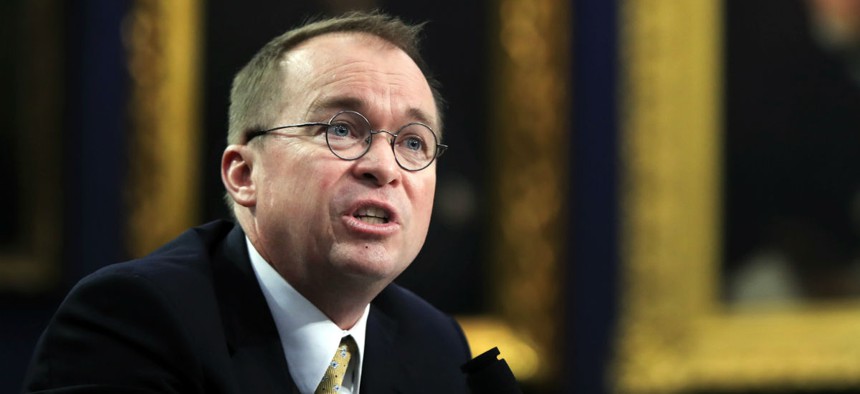OMB Chief Defends Pay Freeze, Pay for Performance
In House testimony, Mulvaney sets May time frame for release of agency reorganization plans.
Office of Management and Budget Director Mick Mulvaney on Wednesday defended the Trump administration’s plan to freeze all federal civilian employee pay in 2019 and more broadly reduce the frequency of step increases moving forward in favor of performance-based pay.
In testimony before a House Appropriations subcommittee, Mulvaney, who splits time between OMB and the Consumer Financial Protection Bureau, said the General Schedule pay scale is outdated and in need of reform.
“The proposal is rooted in data that we had . . . from analysis of the way we paid federal workers, and it seemed to indicate that we over-pay at the lower levels and under-pay at the upper levels,” he said. “Keep in mind that the General Schedule system was created in 1949, and hasn’t really been dramatically overhauled since then.”
The White House’s fiscal 2019 budget proposal freezes all civilian federal employees’ pay in 2019 and in part replaces the across-the-board pay increase with a $1 billion interagency fund for cash bonuses and performance-based pay pilot programs. But while the Trump administration proposed that the money in the fund be appropriated in fiscal 2018, it was omitted from the omnibus spending package enacted last month.
Mulvaney did not address the fact that Congress has not committed to providing money to reward high performers in lieu of step increases. But he argued it would be better than the current system at providing positive performance management incentives.
“What the proposal would say is: Look, we’re going to freeze everybody, and then put a bunch of money in this pot to try and give us the flexibility necessary to reward the people who are really performing well,” he said. “Again, I hope we can all agree that with 2 million non-defense federal workers, some might be really good at their jobs and some might not be, yet we come very close to paying them the same.”
Rep. Sanford Bishop, D-Ga., pushed back on that idea, arguing that removing step increases could effectively reduce workers’ motivation to excel and dissuade people outside of government from joining the federal workforce.
“It seems to me that what you do when you put the [pay] freeze there and remove step increases, you remove incentives to get people to work for the federal government who are highly skilled, who have hopes of a good career that will be remunerative to them,” he said. “It makes it less competitive with the private sector.”
Mulvaney countered that poor performers already have no incentive to improve, in part because managers are hamstrung in the degree to which they can increase employees’ pay.
“If you and I go to work at the Department of Commerce and we come in on the exact same day with the exact same background, and let’s say you do a great job and I dog it, the tools available to our managers to differentiate between our pay are extremely limited," he said. "We’re trying to fix that, so that we do reward folks like you in that circumstance who do good work, and then make it easier to pay me less or get rid of me if I’m performing poorly.”
In a statement on Wednesday, National Treasury Employees Union National President Tony Reardon again decried the White House’s plan to freeze employees’ pay in 2019 and called on Congress to enact a 3 percent across the board raise for feds.
“If the federal government is to have the ability to compete with the private sector in recruiting and retaining a skilled workforce, it is essential that the federal government provide its workers a pay increase,” he wrote.
Mulvaney also gave an update on the status of various agencies’ reorganization plans, which have been under wraps as “predecisional” since departments first submitted them last summer. He said much of the focus of the plans, which he anticipates will be released in May, is on eliminating duplicative services.
“I think we have 46 different federal workforce training programs across 16 different agencies, and that doesn’t make much sense,” Mulvaney said. “That probably opens the question as to whether or not there’s a duplication of services that could be more efficiently provided. We have data on some of them that actually work . . . but most don’t have that type of results-driven data. So we’ll try to redirect attention to programs that work, and then consolidate programs that don’t.”




